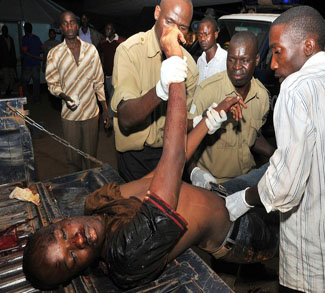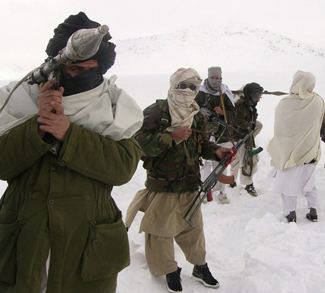FORECAST
Two major developments occurred in Somalia last week: a merger between the Ras Kamboni Brigade and al-Shabab, and al-Shabab’s long-suspected but hitherto unmade declaration of open alliance with Al Qaeda. Both do not bode well for the survival of the beleaguered Transitional Federal Government (TFG) in Mogadishu.
There are three important considerations underpinning al-Shabab’s decision to openly ally with Al Qaeda. First, it implies that the militia group does not fear the targeted US drone strikes that will surely result from the announcement. The perception is that the US military is currently spread thin in Afghanistan, Iraq, and elsewhere, and AFRICOM has not yet developed an operational capacity that can cripple al-Shabab.
Second, open alliance with Al Qaeda will serve as a flag to rally around for disparate Islamist militia groups in Somalia- groups like Kamboni. In the wake of the announcement, even bitter rivals like Hizb-ul Islam experienced high-level defections to al-Shabab. It is possible that al-Shabab is attempting to model itself after the Tehreek-e-Taliban Pakistan and create an umbrella group of Islamist militias who share the common goal of establishing Islamic states around the Horn of Africa. In the end, al-Shabab’s leadership concluded that the benefits derived from openly declaring war on Western interests trumped the relative safety of continued ambiguity.
Finally, the growing Islamist alliance in Somalia allows al-Shabab a free hand to link up with Al Qaeda in the Arabian Peninsula across the Gulf of Aden. Much like the militant nexus along the Afghanistan-Pakistan border, it is now much more likely that the Horn of Africa and Yemen will become a regional theatre of conflict characterized by the free flow of Islamic militants across borders.
Even with last week’s merger, al-Shabab still faces a litany of enemies within the Somali political landscape- least powerful of which is the TFG in Mogadishu. Kamboni’s former allies, Hizb-ul Islam, remain al-Shabab’s bitter enemies and there have been reports of Hizb-ul Islam linking up with the Ethiopia-backed Ahlu Sunna Wal-Jamaa militia to stage joint attacks. From here on out, militias that have remained peripheral will likely rally around the major players, resulting in a spiral of violence and chaos in Somalia.
As conflict intensifies in Somalia, it is unlikely that the TFG will survive. The government currently presides over a few city blocks and the airport in Mogadishu, protected by a small force of 4,500 African Union peacekeepers (AMISOM). Restrictive rules of engagement and clashes with TFG forces keep AMISOM from being an effective deterrent. Moreover, it is commonly held that the only reason that the TFG has survived this long is weakness and infighting among Somalia’s tribes and militias.
The next stage of conflict in Somalia will be characterized by: TFG collapse, an explosion in refugee flows, and consequently new recruitment opportunities for al-Shabab and Al Qaeda in the Arabian Peninsula. Authorities in Washington will be watching the situation unfold with no small amount of consternation.
SUMMARY OF EVENTS: February 1st – February 8th, 2010
NORTH AMERICA
United States
The family of a former Gitmo detainee are still waiting years later for answers regarding the events leading up to their son’s death.
President Barack Obama proposed scrapping a Bush administration plan to return astronauts to the moon by 2020 in a budget for NASA that would instead farm out some space operations to companies for missions closer to Earth.
US Defence Secretary Robert Gates has sacked the marine general overseeing a $40bn (£25bn) project to build the next generation strike fighter jet.
The US will take on a broader range of military responsibilities, including defending space and cyberspace, in spite of growing pressure on budgets, a long-awaited administration report is set to conclude on Monday.
EASTERN EUROPE
Ukraine
The opposition leader Viktor F. Yanukovich declared victory on Sunday in presidential elections in Ukraine, claiming what appeared to be an unlikely comeback from his humiliating defeat in the 2004 Orange Revolution, when he was shunned as a bumbling Kremlin sidekick.
Romania
Romania has agreed to host missile interceptors as part of a new US defence shield, its president says.
WESTERN EUROPE
United Kingdom
Gordon Brown has denied troops were sent to Iraq and Afghanistan without the equipment they needed after being accused of “guillotining” the budget.
Tony Blair’s cabinet was “misled” into thinking the war with Iraq was legal, ex-International Development Secretary Clare Short has told the UK’s inquiry.
MIDDLE EAST
Iran
Iranian police will show no more tolerance towards anti-government protesters, the force’s chief was quoted as saying on Saturday, in a warning to the opposition before possible new demonstrations next week.
Mahmoud Ahmadinejad, the Iranian president, has instructed Iran’s Atomic Energy Organisation to begin enriching uranium for use as nuclear fuel, casting doubt on the prospect of a deal with the West.
Iran said on Tuesday it was ready to send its uranium abroad for further enrichment as requested by the U.N.
The United States has reacted cautiously over a statement from Iran’s president saying he accepts a UN-proposed deal to swap enriched uranium for nuclear fuel.
Yemen
Al-Qaeda in the Arabian Peninsula number two Said al-Shihri called for attacks against US interests “everywhere,” in an audio message released on the Internet on Monday.
Iraq
Preparations for elections in Iraq next month have been thrown into disarray by a row over whether to uphold a ban on hundreds of candidates.
Israel
Israel on Wednesday that peace talks with the Palestinians are likely to resume “within the coming weeks.”
Israel has reprimanded two high-ranking military officers over the firing of white phosphorous shells towards a heavily populated area and a UN compound.
SOUTH ASIA
Pakistan
India has offered to hold foreign-secretary level talks with Pakistan, two Indian television stations said on Thursday, resuming a bilateral dialogue suspended after the 2008 Mumbai attacks.
A major Pakistan Taliban base in the north-western tribal region of Bajaur has been captured by Pakistani troops after days of fierce fighting, officials say.
The Pakistan Taliban has dismissed reports on state television suggesting that Hakimullah Mehsud, the head of the group, had been killed and subsequently buried.
Afghanistan
Richard Holbrooke, the special U.S. representative to Afghanistan and Pakistan, was commenting on recent media reports alleging “secret” U.S.-Taliban meetings.
EAST ASIA
China
Iran Foreign Minister Manouchehr Mottaki has said that China is keen to join the IPI Pipeline Project.
China warned Tuesday that President Barack Obama’s plans to meet exiled Tibetan spiritual leader the Dalai Lama would harm relations between the two superpowers.
North Korea
U.N. Secretary-General Ban Ki-moon is to send a special envoy to North Korea next week, his office said Sunday, amid international efforts to bring Pyongyang back into disarmament talks on its nuclear weapons programme.
AFRICA
Nigeria
Nigeria’s main armed group has said it was not directly responsible for the sabotage of an oil pipeline that forced Royal Dutch Shell to shut down three pumping stations in the oil-rich Niger Delta region.
Somalia
The Islamic administration of Al-Shabaab that controls Somalia’s southern regions of Jubba has on Sunday declared holy war on Kenya over reports that Nairobi is training Somali troops.
Somali Islamist rebel group al-Shabab has confirmed for the first time that its fighters are aligned with al-Qaeda’s global militant campaign.
Sudan
Almost half the population of south Sudan is facing food shortages because of conflict and drought, a fourfold rise in the numbers needing aid since last year, officials said Tuesday.
Zachary Fillingham is a contributor to Geopoliticalmonitor.com



